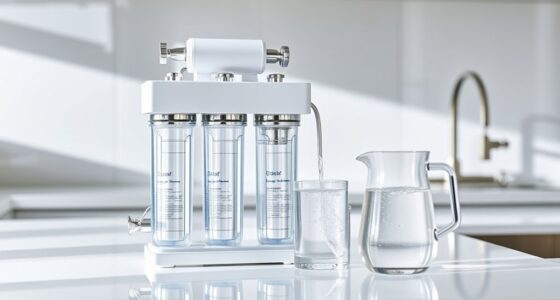If you’re starting your fermentation journey, I recommend exploring top kefir starter kits like Cultures for Health Milk and Water Kefir grains, which are reusable and come with helpful guides. There are also dehydrated cultures and large jars perfect for bigger batches. Whether you want dairy or water kefir, these kits offer easy activation and ongoing support. Keep in mind factors like compatibility and reusability to make the best choice—there’s a lot more to discover ahead.
Key Takeaways
- Reusable heirloom grains and dehydrated starter kits offer sustainable, cost-effective options for continuous kefir production.
- Kits include comprehensive guides, recipes, and support to ensure successful fermentation, especially for beginners.
- Equipment such as jars, strainers, and thermometers simplifies the process and enhances batch quality.
- Suitable for various liquids—milk, water, juice—allowing diverse flavoring and dietary preferences.
- Quality, re-culturing capacity, and user support make these kits ideal for both novices and experienced fermenters.
Cultures for Health Milk Kefir Grains, DIY Non-GMO Probiotic Drink
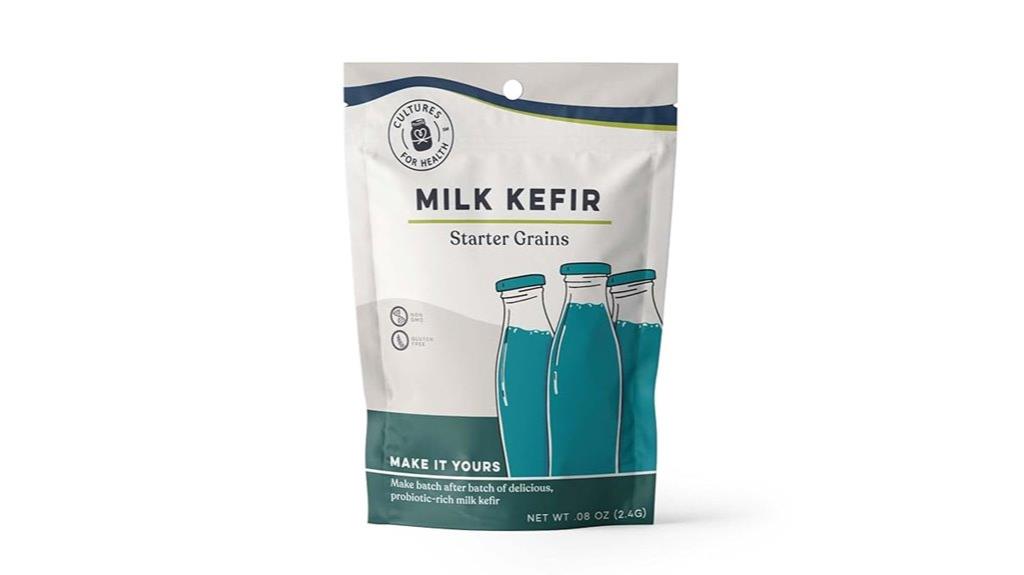
If you’re looking for an easy, sustainable way to enjoy probiotic-rich kefir at home, Cultures for Health Milk Kefir Grains is an excellent choice. These heirloom-style grains are designed for continuous kefir production, yielding a quart daily with minimal effort—just ferment in milk for 12-24 hours at 68-85°F. The dehydrated grains extend shelf life and are easy to store, making them perfect for beginners. Reusable and GMO-free, they provide a limitless supply of health-boosting kefir packed with probiotics, vitamins, and minerals. Plus, you can flavor or incorporate it into recipes, enhancing your healthy lifestyle effortlessly.
Best For: those interested in making their own probiotic-rich kefir at home with a sustainable, easy-to-maintain, and versatile method.
Pros:
- Reusable heirloom grains provide a limitless supply of kefir from a single purchase
- Easy to ferment with minimal effort, suitable for beginners
- GMO-free and extendable shelf life with dehydrated storage
Cons:
- Requires a consistent temperature of 68-85°F for optimal fermentation
- Needs daily attention to produce a fresh quart of kefir
- Dehydrated grains may take time to fully rehydrate and start producing kefir effectively
Cultures for Health Kefir Starter Culture (4 Packets)
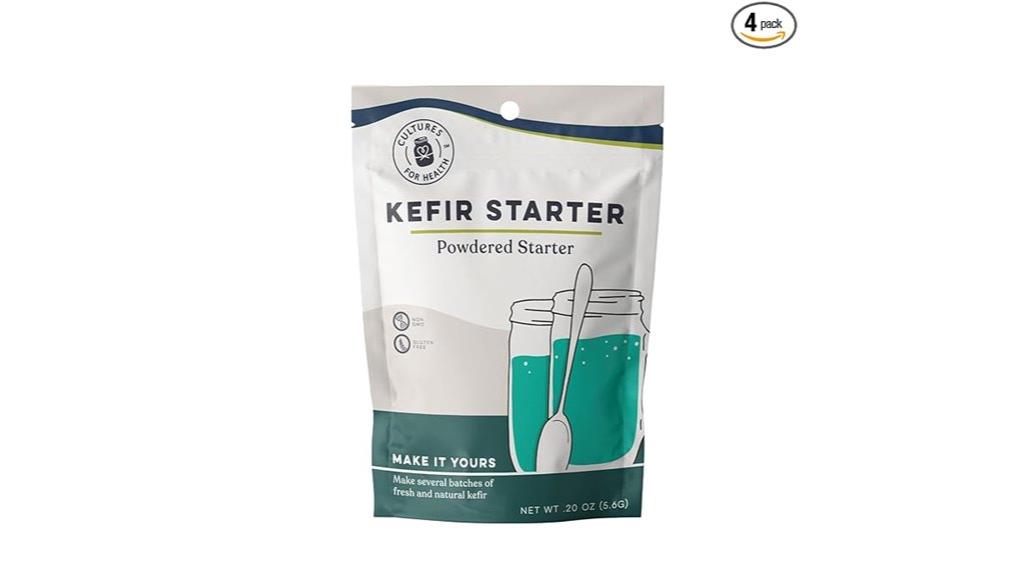
Cultures for Health Kefir Starter Culture (4 Packets) is an excellent choice for beginners who want a simple and reliable way to make kefir at home. This freeze-dried powder works with milk, water, or juice, making it versatile and easy to use. Each packet can be re-cultured 2-7 times, offering great value and cost-effectiveness. You only need to reserve a small amount from each batch to start the next. It’s perfect for those new to kefir, with no need to maintain kefir grains. Plus, each batch is tested for safety, ensuring high-quality, probiotic-rich drinks that support digestive health.
Best For: beginners and home kefir enthusiasts seeking an easy, cost-effective way to make probiotic-rich drinks with versatile liquids.
Pros:
- Easy to use and beginner-friendly, no need to maintain kefir grains
- Re-cultures 2-7 times per packet, offering great value
- Compatible with various liquids like milk, water, juice, and plant-based milks
Cons:
- Requires reserving a small amount from each batch for re-culturing
- Limited to 2-7 re-cultures per packet; may need frequent purchases for ongoing use
- Does not include detailed instructions or flavor options for different liquids
Cultures for Health Water Kefir Grains (Heirloom Starter)

Cultures for Health Water Kefir Grains (Heirloom Starter) stands out as an excellent choice for anyone seeking a long-lasting, DIY probiotic option. These dehydrated, heirloom grains can be re-cultured indefinitely from a single purchase, making them cost-effective and sustainable. Rehydration is straightforward: soak 1/4 cup in warm purified water with sugar, wait 3-4 days until they turn translucent, then strain and start new batches. They produce a naturally fizzy, probiotic-rich beverage in about 48 hours. While some users encounter variability in grain activity, choosing reputable sources and following care tips can help ensure successful fermentation and a revitalizing, dairy-free kefir.
Best For: individuals interested in creating their own probiotic, dairy-free water kefir at home with a sustainable, long-lasting starter culture.
Pros:
- Re-cultures indefinitely from a single purchase, offering long-term savings and sustainability.
- Easy to rehydrate and use with clear instructions, suitable for beginners and experienced fermenters alike.
- Produces a naturally fizzy, probiotic-rich beverage that supports digestive health and can be flavored or used in recipes.
Cons:
- Variability in grain activity and viability may result in inconsistent fermentation results.
- Some users report that dehydrated grains can appear dark and may not develop translucency or fizz if not stored properly or if aged.
- Success depends on proper care, water quality, and temperature; improper handling can hinder fermentation or reduce grain vitality.
Milk Kefir Grains and eBook (Milk Kefir Unleashed by Thomas Egbert)
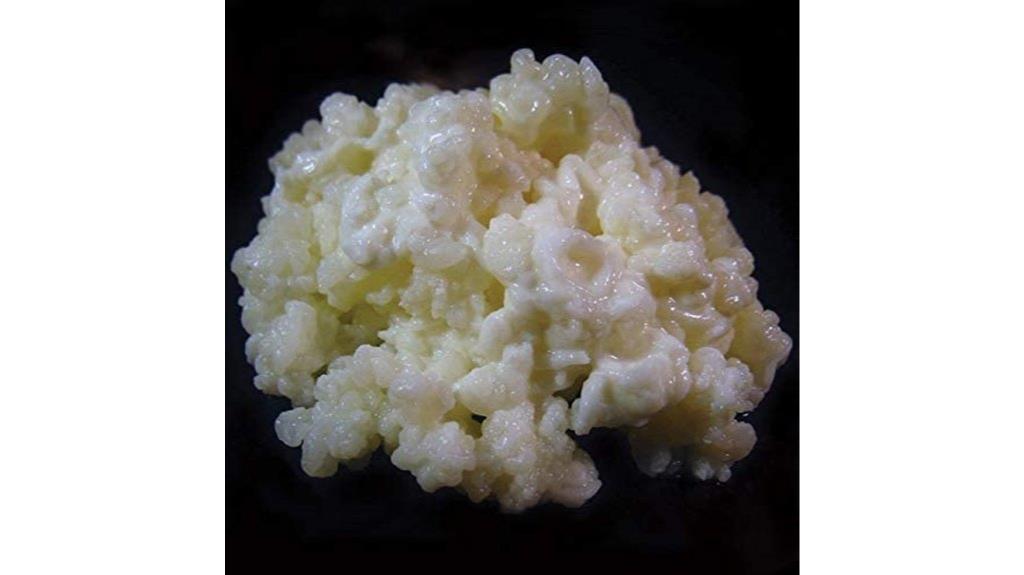
For anyone enthusiastic to start making high-quality kefir at home, the Milk Kefir Grains and eBook package from Thomas Egbert is an excellent choice. It includes 1 tablespoon of fresh, lively grains that are suitable for the whole family and can be reused to produce ample kefir, making it cost-effective. The package offers unlimited email support and a detailed 51-page eBook filled with images, tutorials, and recipes to guide you every step of the way. Carefully cultivated and fed daily for maximum health benefits, these grains help you create probiotic-rich kefir that promotes gut health and wellness.
Best For: individuals and families eager to start making high-quality, probiotic-rich kefir at home with comprehensive guidance and ongoing support.
Pros:
- Includes 1 tablespoon of fresh, live kefir grains suitable for the entire family.
- Reusable grains produce large quantities of kefir, offering excellent cost savings over store-bought options.
- Comes with unlimited email support and a detailed 51-page eBook with step-by-step instructions, recipes, and tutorials.
Cons:
- Requires time and effort to cultivate and maintain the grains properly.
- Initial setup may involve a learning curve for beginners unfamiliar with fermentation.
- The package size (1 tablespoon of grains) may seem small for those wanting immediate large-scale production.
Cultures for Health Kefir Starter Culture (4 Packets)
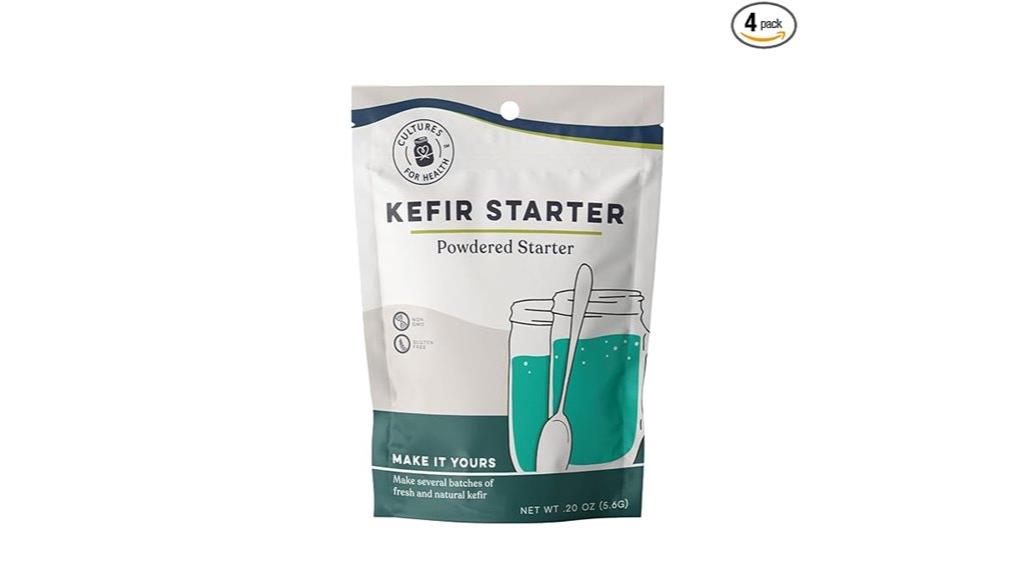
If you’re new to making kefir at home and want a straightforward, reliable starter, the Cultures for Health Kefir Starter Culture (4 Packets) is an excellent choice. This freeze-dried powder works with milk, water, or juice, making it versatile and easy to use. You only need to reserve 1/4 cup from your previous batch to re-culture, which makes it cost-effective and sustainable. Each packet can be re-cultured 2-7 times, providing multiple batches. Plus, its safety is guaranteed through pathogen testing, ensuring high-quality kefir every time. It’s perfect for beginners looking for a fuss-free way to enjoy probiotic-rich drinks at home.
Best For: Beginners and home enthusiasts seeking an easy, cost-effective way to make probiotic kefir using various liquids without maintaining kefir grains.
Pros:
- Simple, beginner-friendly powder that requires no kefir grain maintenance
- Versatile, works with milk, water, juice, coconut water, or plant-based milks
- Re-cultures 2-7 times per packet, making it economical and sustainable
Cons:
- Limited to 2-7 batches per packet, requiring purchase of additional packets for ongoing use
- May produce slightly varying results depending on re-culturing conditions
- Not suitable for those preferring traditional kefir grains or specific fermentation techniques
Jarming Collections Kefir and Kombucha Starter Kit
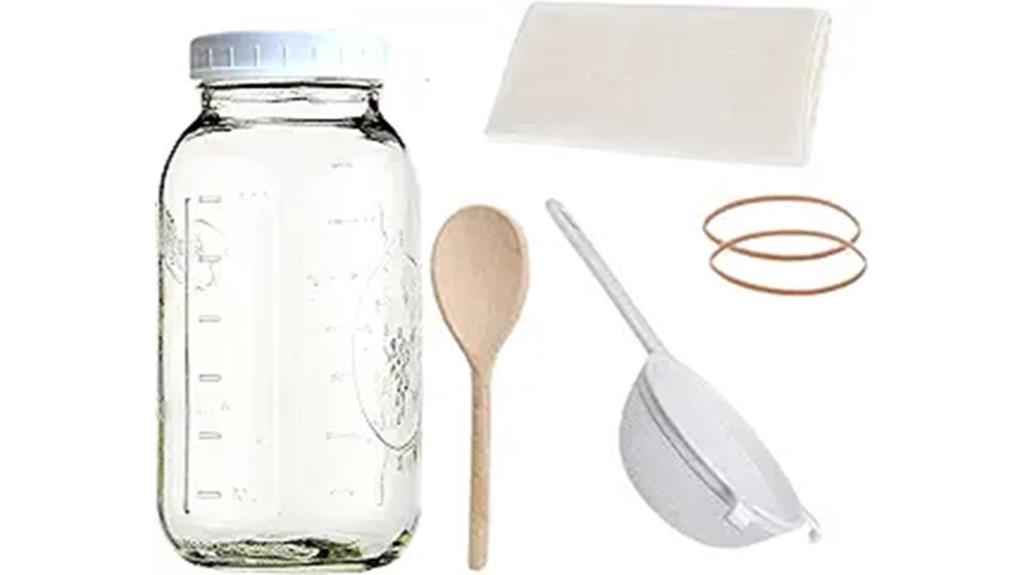
The Jarming Collections Kefir and Kombucha Starter Kit is an excellent choice for home brewers who want to make large batches of kefir or kombucha with ease. It features a half-gallon wide-mouth glass jar, perfect for producing ample amounts to share or enjoy weekly. The kit includes a plastic lid, nylon mesh strainer, cotton cloth cover, and a wood spoon, simplifying the fermentation process and making cleanup straightforward. Its natural materials promote eco-friendliness and sustainability. While some components may have minor flaws, the kit’s all-in-one design makes it easy for both beginners and seasoned fermenters to create fresh, homemade kefir or kombucha effortlessly.
Best For: home fermentation enthusiasts of all experience levels seeking an all-in-one kit to make large batches of kefir or kombucha easily and sustainably.
Pros:
- Complete set with all necessary components for brewing and straining kefir or kombucha
- Large half-gallon glass jar ideal for making substantial batches to share or store
- Eco-friendly materials and straightforward design simplify the fermentation process and cleanup
Cons:
- Some components, like the small strainer and wooden spoon, may be of basic quality or prone to clogging or damage
- Cotton cloth cover may come undone or lack durability due to minimal stitching
- Users have reported missing items or the need to purchase additional strainers or utensils for full functionality
Natural Probio Water Kefir Grains Starter Culture Kit with Guide, Recipes & Support
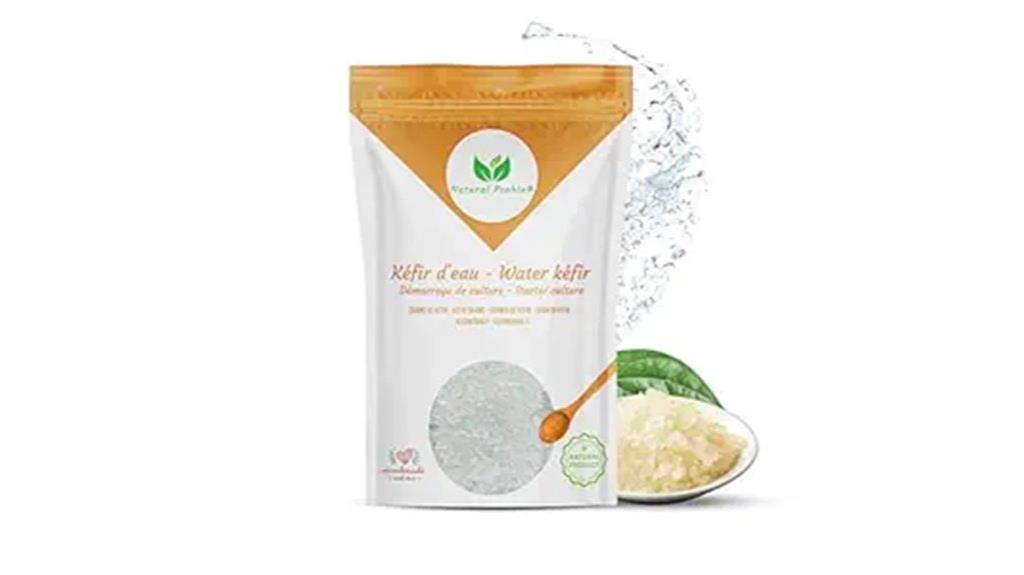
Natural Probio Water Kefir Grains Starter Culture Kit stands out as an ideal choice for beginners and experienced fermenters alike, thanks to its all-inclusive guide, recipes, and dedicated support. It includes 0.35 oz dehydrated grains—equivalent to 2 oz fresh—that are 100% reusable for life, ensuring continuous kefir making. The kit offers detailed instructions, a recipe booklet, and access to an ebook library, making the process straightforward. Lab-tested for safety, water kefir is a probiotic-rich beverage that promotes gut health. Plus, the company’s support and lifetime guarantee give me confidence in trying my hand at homemade, healthy, fizzy drinks.
Best For: both beginners and seasoned fermenters seeking an easy, reliable way to make probiotic water kefir at home with comprehensive guidance and ongoing support.
Pros:
- Includes dehydrated grains equivalent to 2 oz fresh, reusable for life, ensuring continuous production.
- Comes with a detailed guide, recipes, and access to an ebook library for expert tips and variety.
- Lab-tested for safety and backed by a lifetime guarantee, with customer support available for troubleshooting.
Cons:
- Requires activation upon delivery, which may be intimidating for complete beginners.
- The kit’s initial cost might be higher compared to buying individual ingredients or smaller starter cultures.
- As a dehydrated product, it may take some time and patience to fully activate and start brewing successfully.
Masontops Kefir Lid Mason Jar Lids (2-Pack)
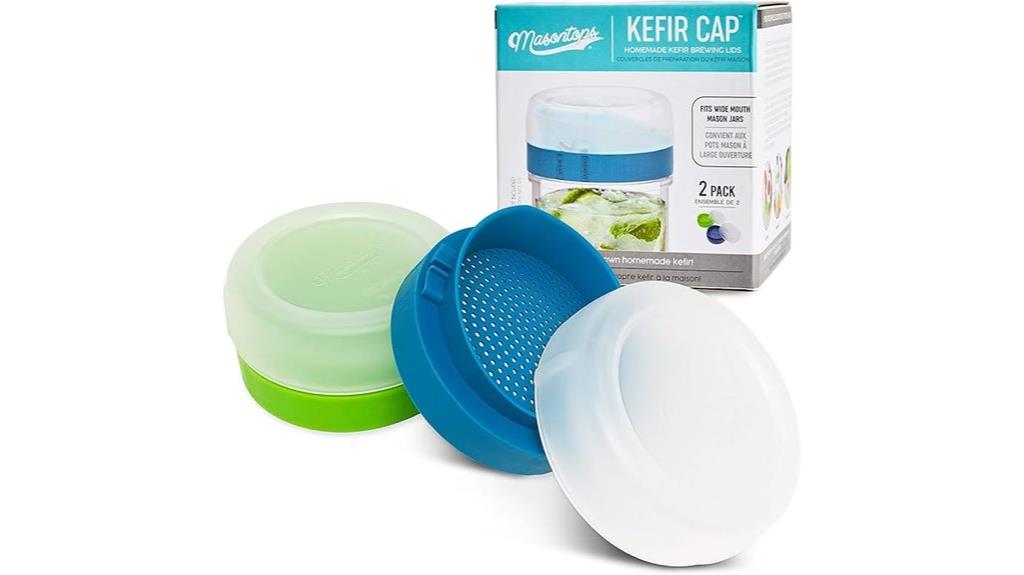
Masontops Kefir Lid Mason Jar Lids (2-Pack) are perfect for home fermenters seeking an all-in-one solution to make water or milk kefir easily. These lids convert standard wide-mouth mason jars into efficient kefir fermenters with a simple twist mechanism—open for fermentation, closed for storage. The clear top doubles as a measuring cup, while the bottom strains grains during pouring. Made of durable glass, they’re dishwasher and microwave safe, and come in vibrant colors like blue, green, and clear. With their combined functionality, these lids streamline the kefir-making process, making it easier and more convenient to enjoy homemade, probiotic-rich kefir regularly.
Best For: home fermenters and kefir enthusiasts looking for an easy, all-in-one solution to make and store probiotic-rich kefir using mason jars.
Pros:
- Combines measuring, straining, and storage functions into one convenient lid system
- Made of durable, dishwasher- and microwave-safe glass for easy cleaning and reusability
- Comes with color-coded lids (blue and green) for tracking different batches
Cons:
- Limited to wide-mouth mason jars, which may not fit other jar sizes
- Relies on manual operation without any electronic components or automation
- May require some initial practice to master the twist mechanism for open/closed settings
Honeydak 8 Pcs Kefir Starter Kit with Mason Jars and Accessories
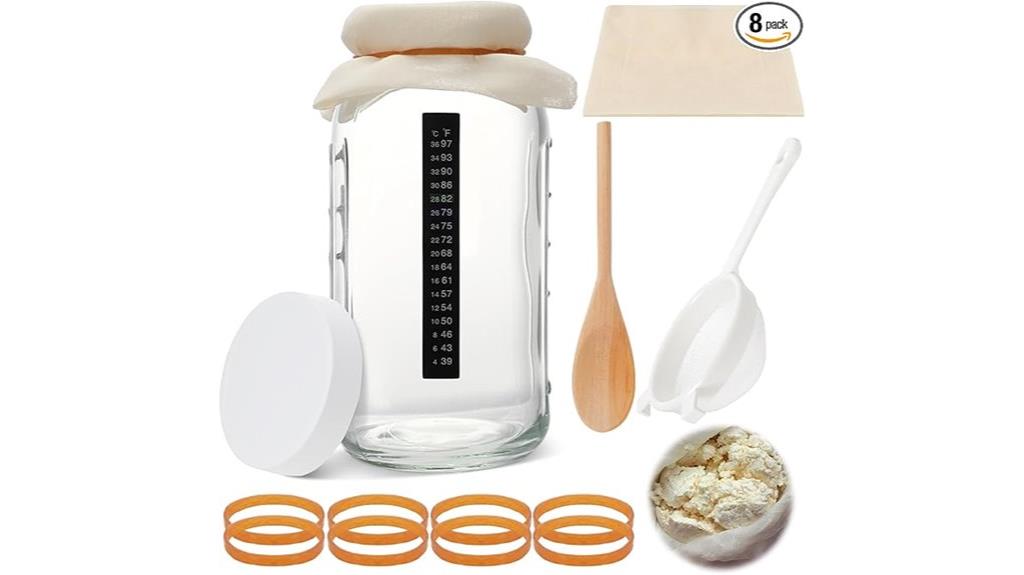
If you’re looking for a complete starter kit that simplifies home kefir and kombucha brewing, the Honeydak 8 Pcs Kefir Starter Kit is an excellent choice. It includes a spacious 64 oz wide-mouth mason jar, a plastic lid, cheesecloths, a strainer, a thermometer patch, a wooden spoon, rubber bands, and detailed instructions. The durable glass jar won’t retain odors, making it perfect for repeated use. The large capacity means you can make enough kefir or kombucha to share or enjoy throughout the week. Its versatile filtering tools and straightforward design make fermentation accessible for both beginners and experienced fermenters alike.
Best For: home fermentation enthusiasts of all experience levels looking for a comprehensive, durable kit to make kefir and kombucha easily at home.
Pros:
- Includes all essential tools and accessories for immediate fermentation setup.
- Large 64 oz jar allows for making sufficient quantities to share or enjoy throughout the week.
- Made of durable, odor-free glass, ensuring repeated use without retaining flavors.
Cons:
- Additional ingredients like grains, sugar, or flavorings are needed to start fermentation.
- Some users might find the size cumbersome for limited countertop space.
- Limited color options and slight variation in product appearance due to packaging.
Cultures for Health Milk Kefir Grains for Gut Health

Cultures for Health Milk Kefir Grains are an excellent choice for beginners and health-conscious individuals seeking a reliable, long-term probiotic source. These heirloom grains produce a quart of kefir daily with minimal effort—just ferment in milk for 12-24 hours at 68-85°F. They can be reused indefinitely, offering a sustainable probiotic boost. Arriving dehydrated, they have a long shelf life and are easy to store. Kefir from these grains contains three times more probiotics than yogurt and is rich in nutrients like vitamin D, calcium, and B12. Versatile and low maintenance, they’re perfect for incorporating into smoothies, recipes, or enjoying plain.
Best For: health-conscious individuals, beginners, and those seeking a sustainable probiotic source to easily incorporate gut-friendly kefir into their diet.
Pros:
- Produces a quart of kefir daily with minimal effort, ideal for daily use.
- Reusable indefinitely, offering a long-term, cost-effective probiotic option.
- Rich in probiotics and nutrients like vitamin D, calcium, and B12, supporting overall health.
Cons:
- Requires fermenting in milk for 12-24 hours at specific temperatures, which may need some attention to detail.
- Arrives dehydrated and needs rehydration before first use, requiring some preparation.
- May not be suitable for those with dairy allergies or lactose intolerance.
1 TBSP Milk Kefir Grains and eBook Milk Kefir Unleashed
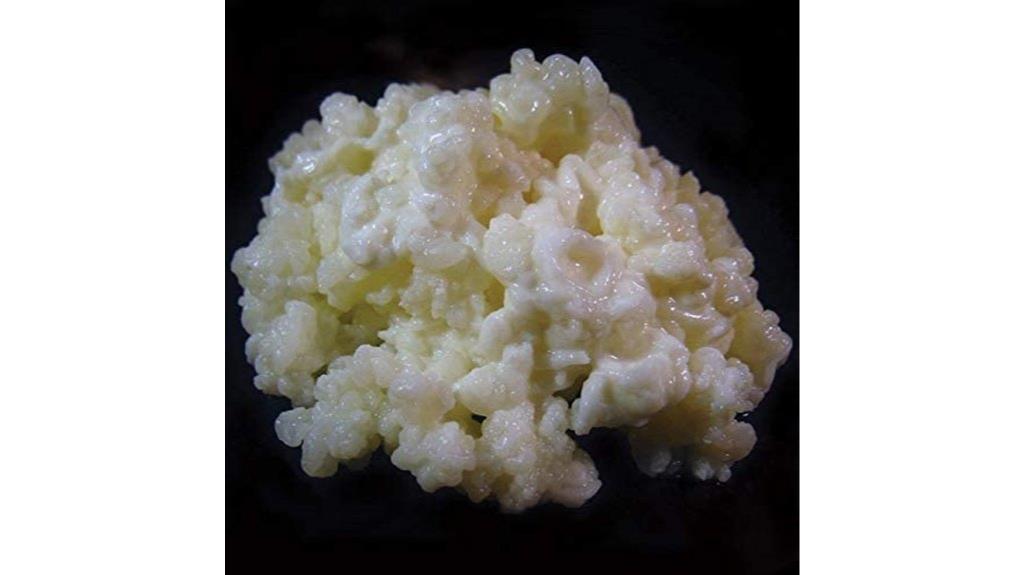
For anyone new to kefir making or seeking a reliable starter kit, the TBSP Milk Kefir Grains and eBook Milk Kefir Unleashed offer an excellent combination of quality and support. The kit includes 1 tablespoon of fresh, lively kefir grains that are reusable and perfect for the whole family. It also comes with a detailed 51-page eBook packed with images, tutorials, and recipes to guide you through the process. Plus, unlimited email support guarantees you can ask questions anytime. This set makes cultivating healthy probiotics easy, cost-effective, and enjoyable, setting you up for success in your kefir fermentation journey.
Best For: those new to kefir making or anyone seeking a comprehensive, supportive starter kit to easily cultivate healthy probiotics at home.
Pros:
- Includes 1 tablespoon of fresh, active kefir grains that are reusable and suitable for the whole family
- Comes with a detailed 51-page eBook featuring images, tutorials, and recipes to ensure success
- Provides unlimited email support for ongoing questions and guidance
Cons:
- Requires daily feeding and maintenance to keep the grains healthy and productive
- Might be less convenient for those preferring pre-made or store-bought kefir options
- The initial setup and learning curve may be slightly challenging for complete beginners
Water Kefir Essentials Kit with Grains and Fermenting Jar
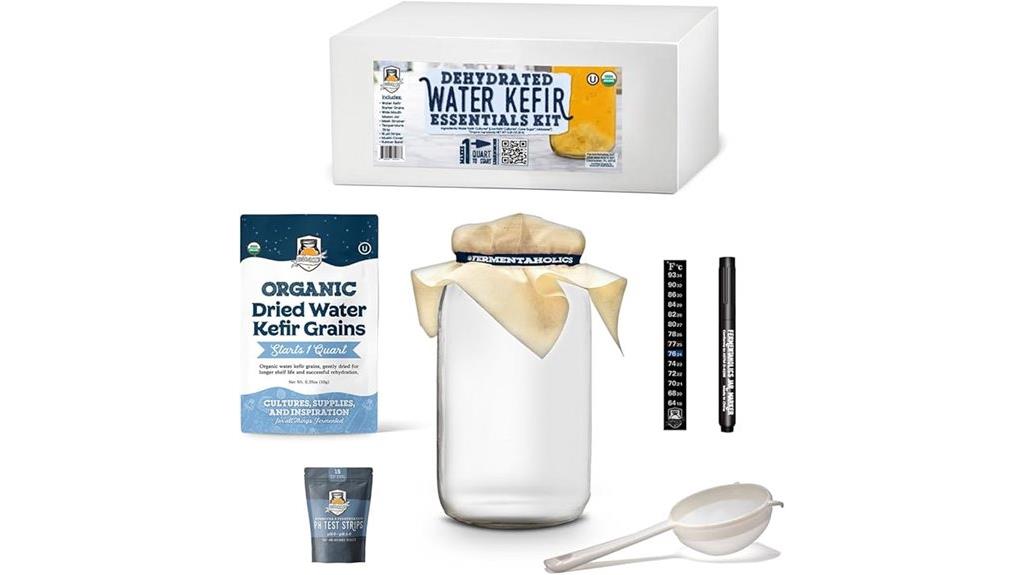
The Water Kefir Essentials Kit with Grains and Fermenting Jar is an ideal choice for home brewers seeking a complete, easy-to-use starter set. It includes dehydrated organic water kefir grains, a 1-quart wide-mouth glass fermenting jar with a breathable cover, rubber band, pipette, thermometer strip, jar marker, pH test strips, and a mesh strainer. The grains are organic, kosher, and cultivated in a licensed lab to guarantee freshness and potency. Step-by-step instructions and customer support make brewing straightforward. This kit offers a sustainable, customizable alternative to store-bought kefir, allowing you to create fizzy or still drinks tailored to your taste.
Best For: home fermentation enthusiasts and health-conscious individuals looking for a sustainable, customizable water kefir brewing kit.
Pros:
- Includes all necessary components for start-to-finish water kefir brewing, making it beginner-friendly.
- Organic, kosher grains cultivated in a licensed lab ensure high quality and freshness.
- Supports eco-friendly practices by offering a reusable alternative to store-bought kefir and single-use bottles.
Cons:
- Customer ratings are average at 4.0 out of 5 stars, indicating some users may experience difficulties.
- The kit’s dimensions and weight might be less convenient for storage or portability.
- Limited information on long-term customer support and warranty details.
Live Kefir Grains Starter Culture
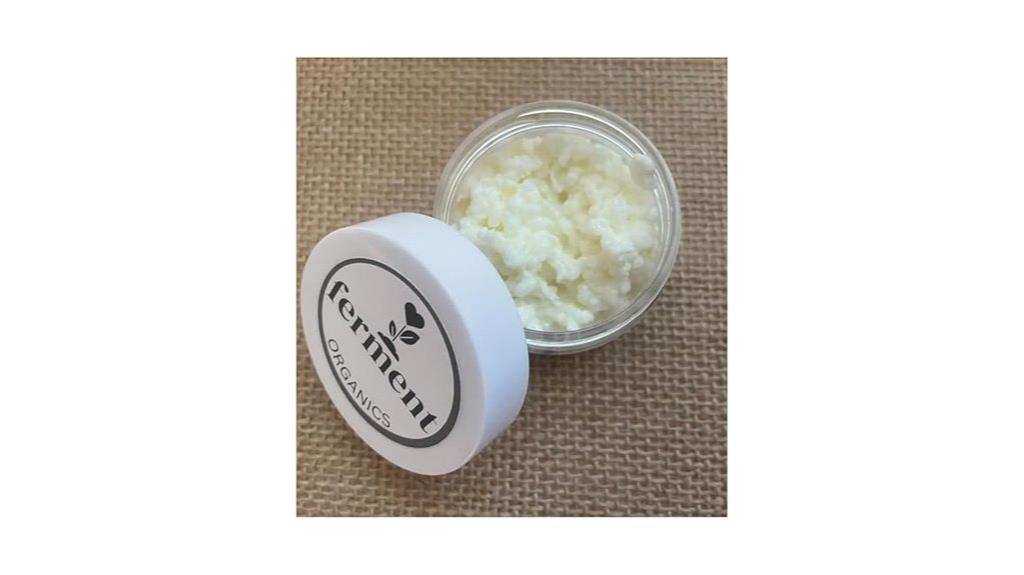
If you’re serious about making your own probiotic-rich kefir at home, a live kefir grains starter culture is an ideal choice. I love that it includes one tablespoon of fresh, active grains, rich in beneficial probiotics. The complete kit comes with utensils like a wood spoon and cheesecloth, plus guides and recipes to get you started easily. Shipped directly from the producer in sealed containers, these grains are never frozen, ensuring top quality. They’re reusable and can be cultured for a lifetime, making kefir brewing cost-effective and sustainable. With proper care, your grains will multiply quickly, providing ongoing probiotic goodness and versatility in your kitchen.
Best For: home kefir enthusiasts seeking a natural, probiotic-rich beverage with ongoing, cost-effective production and comprehensive guidance.
Pros:
- Reusable and long-lasting, providing a sustainable source of kefir grains that multiply over time.
- Complete starter kit includes utensils, guides, and recipes, making it easy for beginners to start fermenting.
- Shipped fresh and never frozen, ensuring high-quality, active probiotics for optimal fermentation.
Cons:
- Initial slow growth may require patience as grains establish and multiply.
- Shipping conditions or handling may occasionally affect grain viability or cause packaging issues.
- Some users may confuse curds for grains or experience initial adaptation challenges.
Water Kefir Grains, Starter Cultures, Bulgaros de Agua Vivos
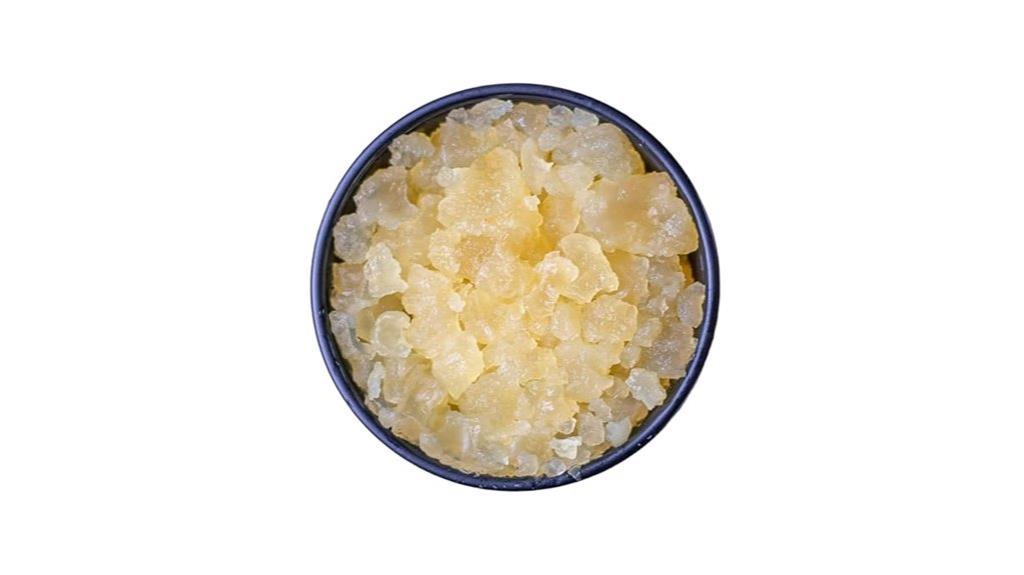
Water Kefir Grains, Starter Cultures, Bulgaros de Agua Vivos are ideal for anyone seeking a simple, healthy way to enjoy probiotic-rich beverages at home. These live, dormant kefir grains from The Spirit Of The Forest come dried and require activation with water. Once ready, they produce invigorating, gut-friendly drinks that are non-dairy, GMO-free, caffeine-free, and keto-compatible. Easy to use with our starter kit, they’re perfect for beginners or experienced fermenters. Versatile and fun, they let you craft water kefir or experiment with different liquids. Their probiotic culture of bacteria and yeast makes them a healthy addition to any diet.
Best For: those interested in making probiotic-rich, non-dairy beverages at home, whether beginners or experienced fermenters.
Pros:
- Easy to activate and use with the starter kit, suitable for all skill levels
- GMO-free, caffeine-free, and keto-friendly, supporting various dietary preferences
- Versatile for creating water kefir and experimenting with different liquids and flavors
Cons:
- Require water activation before use, which may take some time for initial fermentation
- Dormant state means the grains need proper care and patience to become active and produce beverages
- Limited to water-based fermentations, not suitable for dairy or other types of fermentation
Cultures for Health Water Kefir Grains for Gut Health
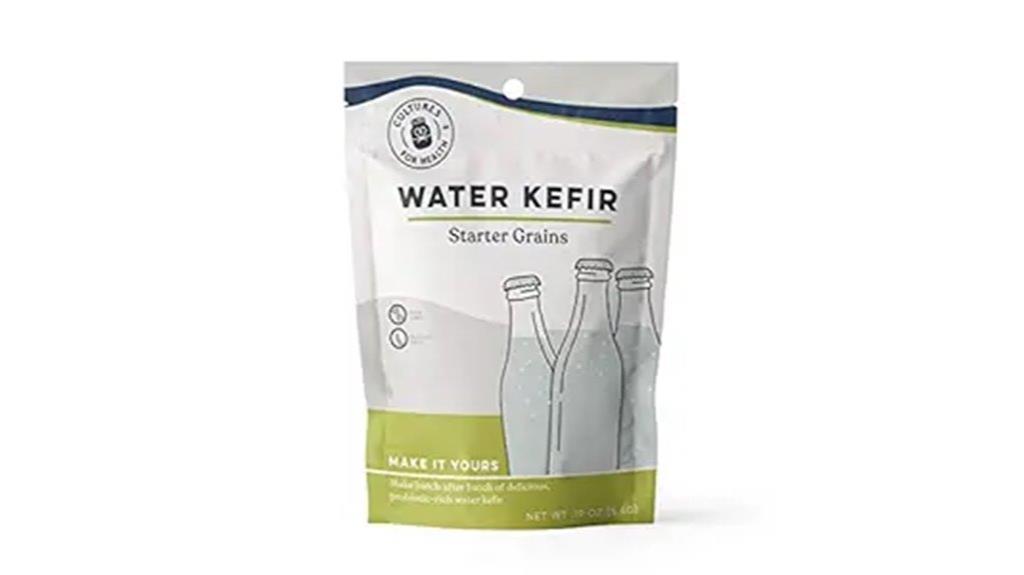
Cultures for Health Water Kefir Grains are an excellent choice for anyone seeking a reliable, long-lasting probiotic starter. These heirloom, dehydrated grains can be re-cultured indefinitely from a single purchase, providing a continuous supply of gut-friendly kefir. They’re easy to rehydrate by soaking in warm, purified water with organic sugar until translucent, then start new batches every 48 hours. Packed with enzymes and probiotics, water kefir supports digestion and overall gut health. While quality can vary, sourcing from reputable suppliers improves success. With proper care and patience, these grains produce a bubbly, flavorful beverage that’s dairy-free, invigorating, and beneficial for your digestive system.
Best For: individuals seeking a sustainable, dairy-free probiotic source who want to make their own fizzy, gut-friendly kefir at home.
Pros:
- Re-culturable indefinitely from a single purchase, offering long-term value
- Rich in enzymes and probiotics to support digestive health
- Easy to rehydrate and use, suitable for beginners and experienced fermenters alike
Cons:
- Quality and activity can vary depending on storage and source, sometimes leading to weak grains
- Some batches may not produce strong fermentation or fizz, requiring troubleshooting
- Dehydrated grains may appear dark brown initially and need proper rehydration to become translucent
Factors to Consider When Choosing a Kefir Grains Starter Kit
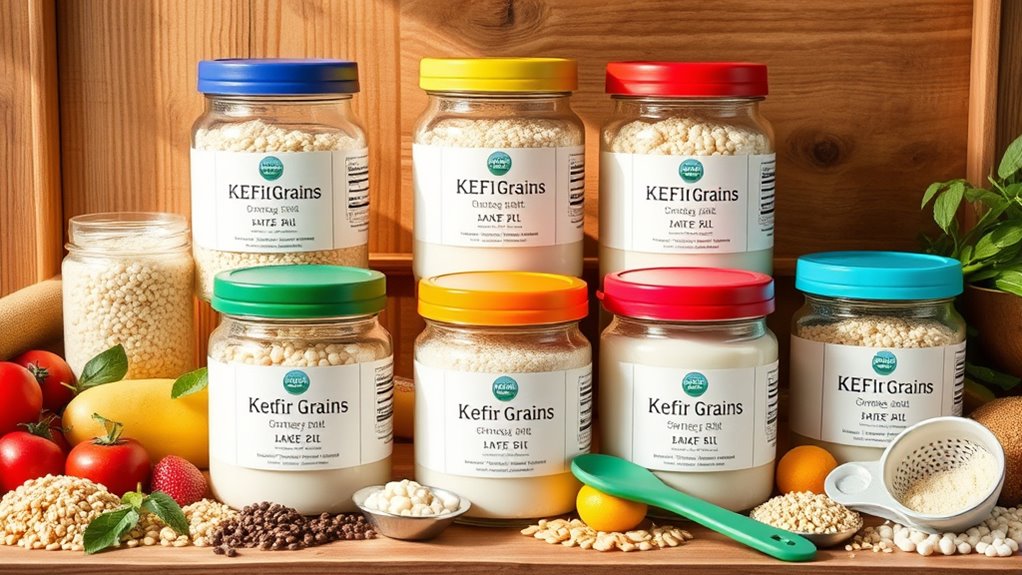
When choosing a kefir grains starter kit, I consider factors like the type and origin of the grains, since that affects flavor and growth. I also look at how easy it is to activate the grains and their reusability over time, ensuring they last. Finally, I check if the kit suits different beverages, along with storage needs and shelf life to keep everything fresh.
Grain Type and Origin
Choosing the right kefir grains starter kit depends heavily on their type and origin, as these factors directly affect their performance and the flavor of your kefir. Authentic grains from reputable sources are typically healthier, more active, and have a richer probiotic profile. The origin, whether heirloom or commercial, influences their longevity and microbial diversity, which impacts taste and health benefits. Different types—milk kefir, water kefir, or kombucha SCOBYs—are designed for specific fermentation mediums and flavor profiles, so selecting the right type is essential. Additionally, whether grains are fresh or dehydrated affects their rehydration and initial fermentation success. Understanding the origin and type helps guarantee you choose grains that will thrive and produce the kefir you desire.
Ease of Activation
The ease of activating kefir grains largely depends on their moisture content and freshness. Fresh, live grains activate faster and more reliably, often producing kefir within 24 to 48 hours. Dehydrated grains need proper rehydration before fermentation can start, which adds an extra step. Temperature also plays a vital role; keeping the environment around 75-80°F helps bacteria and yeast thrive, speeding up the process. Using filtered or spring water and avoiding metal utensils can prevent contamination and improve success rates. Clear, detailed instructions and access to support resources make a big difference, especially for beginners. A kit that provides straightforward guidance can turn activation from a frustrating trial into a smooth, satisfying start to your fermentation journey.
Reusability and Lifespan
Reusability and lifespan are essential factors to contemplate because high-quality kefir grains can be cultivated and maintained indefinitely with proper care. When I choose a starter kit, I look for grains that can be reused over many batches, reducing waste and cost. The lifespan of kefir grains depends on regular feeding, maintaining the right temperature, and avoiding contamination—these practices can help extend their usability for years. Dehydrated or dried grains offer flexibility since they can be rehydrated and revived multiple times, making them ideal for beginners. The vitality and health of the grains directly impact their reusability; healthy grains produce consistent fermentation and last longer. Ultimately, durable kefir grains mean ongoing, eco-friendly, and economical kefir production without constantly buying new cultures.
Compatibility With Beverages
When selecting a kefir starter kit, it’s important to contemplate whether the grains are compatible with the beverages I plan to ferment. Different kits are designed for specific liquids, such as milk, water, juice, or plant-based options like coconut water and almond milk. I need to check if the kit mentions suitability for these alternatives, as they often require different fermentation conditions. It’s also essential to verify that the grains can adapt to the chosen beverage without losing their health or activity. Additionally, I should look for instructions that guide me on fermenting various liquids, ensuring versatility for my preferences. Ultimately, selecting a kit compatible with my desired beverage ensures successful fermentation, flavor development, and probiotic benefits.
Storage and Shelf Life
Choosing a kefir starter kit requires paying attention to storage options and shelf life to guarantee your grains stay healthy and active. Proper storage, like refrigeration or keeping dehydrated grains in a cool, dry place, can greatly extend their viability. Dehydrated kefir grains generally last 1 to 2 years when stored in airtight, opaque containers away from heat and moisture. Fresh grains, if maintained at a consistent room temperature and regularly re-cultured, can remain active indefinitely. However, their viability diminishes if exposed to temperature fluctuations, humidity, or direct sunlight, which can hinder fermentation success. Proper labeling and secure storage are essential to prevent contamination and preserve probiotic potency over time. Paying close attention to these factors ensures your kefir grains stay vibrant and effective for ongoing fermentation.
Quality Assurance Standards
Ensuring the safety and quality of kefir grains starts with verifying that the starter kit meets strict quality assurance standards. I look for kits tested for pathogens and certified safe by reputable third-party laboratories, which reassures me of their safety. It’s important that the grains are produced in facilities following strict hygiene and quality control protocols, ensuring cleanliness and consistency. I also check for clear labeling that details the source, organic certification, and whether the grains are heirloom or commercially cultured—transparency matters. Proper packaging is another key factor; it should be sealed well to prevent contamination and keep the grains alive during shipping. Finally, I value guarantees or customer support policies that address product viability and quality concerns after purchase, giving me peace of mind.
Price and Value
The cost of a kefir grains starter kit can vary widely, so it’s important to evaluate the price per batch to determine true value. I recommend comparing the initial price to the estimated number of fermentations the kit can produce over time. Reusable grains or cultures add ongoing value and help reduce long-term expenses. Higher-quality grains may cost more upfront but typically yield better fermentation results and longevity. It’s also smart to look for kits that include helpful resources like recipes, instructions, or support, as these can make your experience smoother. Be cautious of lower-priced kits that might have limited lifespan or activity, which could lead to additional costs for replacements or upgrades later on. Balancing price with quality and extras guarantees you get the best value for your investment.
Frequently Asked Questions
How Long Do Kefir Grains Typically Last With Proper Care?
Kefir grains can last indefinitely with proper care. I’ve kept mine thriving for years by regularly feeding them fresh milk, keeping everything clean, and avoiding contamination. As long as I maintain the right environment and don’t let them dry out or get exposed to harsh chemicals, my kefir grains remain healthy and active. With patience and proper attention, your kefir grains can serve you for a lifetime.
Can I Reuse Kefir Grains Across Different Recipes?
Absolutely, you can reuse kefir grains across different recipes; they’re like the phoenix rising from their own ashes, continually renewing themselves. I’ve used my grains in various batches, and they keep thriving. Just remember to keep them healthy with proper care—regular feeding and gentle handling. This way, your kefir grains become reliable friends that you can count on to create delicious, probiotic-rich drinks time and again.
What Are Signs of Unhealthy or Dead Kefir Grains?
Unhealthy or dead kefir grains often look dull, dry, or rubbery, and they might lose their classic milky appearance. If they stop fermenting and the milk remains unchanged after 24-48 hours, that’s another sign they’re no longer active. Sometimes, they develop an unpleasant smell or mold. If you notice these signs, it’s best to discard them and start fresh to guarantee healthy, tasty kefir.
Are There Any Allergens Associated With Kefir Starter Kits?
No, kefir starter kits generally don’t contain common allergens, but I always check ingredients carefully. While kefir itself is dairy-based, some kits include flavorings or additives that might trigger allergies, like soy or gluten. If you have sensitivities, look for kits labeled allergen-free or made with organic ingredients. It’s better to be cautious, especially if you’re trying fermentation for the first time.
How Do I Troubleshoot Fermentation Issues With My Starter Kit?
If your kefir isn’t fermenting properly, I suggest checking the temperature—ideally, it should stay around 68-78°F. Make sure your grains are healthy and not expired; they should look plump and smell yeasty. Also, verify you’re using filtered or non-chlorinated water, and avoid overfeeding or underfeeding your grains. Sometimes, a quick refresh with fresh milk and a warm spot helps restart the fermentation process.
Conclusion
Choosing the right kefir starter kit is like finding the key to a world of health and flavor. With so many options, your perfect match awaits—ready to transform simple ingredients into a probiotic paradise. Don’t just settle; embrace the journey and let your fermentation adventure flourish. After all, isn’t life just a series of small, flavorful discoveries? Start today, and access the magic within each jar of kefir.



